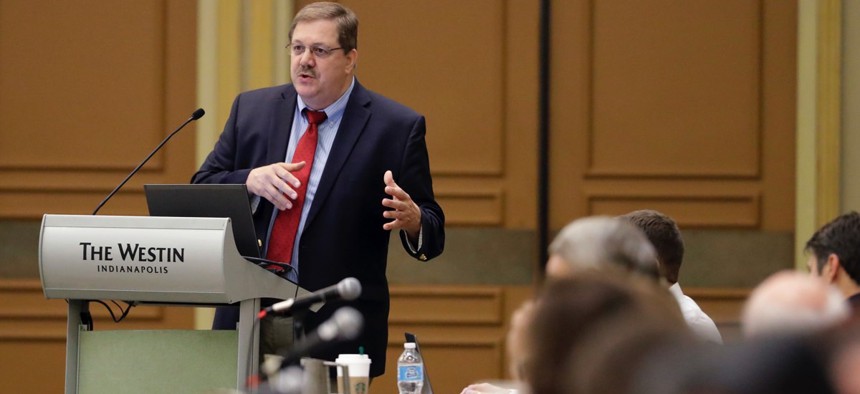Vermont Secretary of State Slams ‘Unfunded Mandate’ in Election Security Bill

Vermont Secretary of State Jim Condos Darron Cummings / AP Photo
Jim Condos says the latest draft will force states like his to spend more money on auditing. Meanwhile, the U.S. Election Assistance Commission says states are focused on cybersecurity ahead of 2018 midterms.
Vermont Secretary of State Jim Condos expressed concern Tuesday with the latest version of a bipartisan election security bill, which would require every state and jurisdiction to conduct a post-election audit of all federal elections beginning in November 2020.
A post-election audit involves the inspection of a random sample of enough marked ballots to establish high statistical confidence the result is accurate.
The Senate Rules Committee had been scheduled to discuss the legislation on Wednesday, but it was postponed. The Secure Elections Act had Condos’ support before language was added requiring audits down to the local level and of primaries in federal races.
“The resources we have now for this work may not be enough if Congress moves forward with mandating audit specifics as they have in the rewrite of the Secure Elections Act,” said Condos, who also serves as president of the National Association of Secretaries of State, on a press call. “This will clearly cause increased costs to all the states, and frankly I look at it as an unfunded mandate.”
Vermont would need to change its statutes to conduct audits of primaries and currently performs them by inspecting 100 percent of ballots and races in a random sample of towns, Condos added.
The rewrite comes as states reveal how they are spending the $380 million approved by Congress and the Trump administration for election security ahead of the 2018 midterms. Almost all of it has been disbursed to states a little more than two months before the midterms, according to the Election Assistance Commission.
But with so little time left, states mostly aren’t tapping those funds to replace voting machines before November.
“It was difficult for any state really to meet their procurement rules and move forward with the purchase for this year’s elections,” Condos said. “I think most states, I can’t say this for a fact, are probably looking with an eye toward 2020—trying to do what they can this year. But, because of the late timing of the appropriation from Congress, it didn’t offer us a large window to maneuver in.”
EAC released 49 of 50 state narratives and budgets for the $380 million, 36 percent of which will be spent by 41 states on improving election cybersecurity ahead of the midterms. That could mean hiring information technology professionals as consultants or full-time staff, establishing partnerships with state National Guard cyber units, or investing in more resilient technology, said Christy McCormick, the group’s vice chairwoman.
States have five years to spend the money, two years to identify matching funds, and can shift where the money goes based on any cyber activity they observe during the midterms—as long as EAC is notified.
Long term, new voting equipment will be purchased in 34 states using 28 percent of the total funds. All 14 of the states that use direct-recording electronic voting machines, which are vulnerable to hackers because they fail to produce a paper trail with which to verify results, will spend at least some funds on replacement, McCormick said.
In addition, 29 states will improve voter registration systems, 24 states will conduct post-election audits, and 18 states will spend the money on election-related communications efforts.
Vermont received $3 million in election security funds and is working on replacing aging optical scan tabulators before 2020, Condos said. The state also unveiled an Accessible Voting System during its primaries, where voters with disabilities record their selections with an electronic tablet that prints out a marked ballot with their selections for them to mail.
Condos said penetration tests—simulated cyberattacks on systems to check for vulnerabilities—are ongoing, and the state continues to invest in two-factor authentication and security training for all town clerks.
Florida is the only state requiring counties to spend election security funds they receive this cycle or else return the money, said EAC Chairman Thomas Hicks.
“If any unspent funds remain, it will be returned to the federal trust fund and the Department will work with Supervisors to develop a plan that addresses any needs identified based on the outcome of the 2018 election,” a Florida Department of State spokesperson wrote Route Fifty in an emailed statement. “Just as we did for this funding, we will put forth a proposed plan for any remaining funds to the Florida Legislature during the 2019 Legislative Session and they have the ultimate authority to approve the spending of any remaining funds.”
The department said it fully funded the requests of all 67 county supervisors of elections for more than $14.5 million to be spent on new and enhanced security measures ahead of the midterms.
End of year reports from each state on how election security funds were actually spend are due in December, and EAC will publish them.
But Condos emphasized that more money will be needed.
“Ongoing resources will allow states to better prepare and invest in replacement equipment preventing urgent, emergency needs for large, one-time appropriations from Congress to address immediate aging technology issues. It’s just smart budgeting,” Condos said. “Receiving those one-time funds every 10 to 15 years is helpful but not conducive to ongoing needs.”
Editor's note: This story was updated after publication to reflect that a Senate hearing on a federal bill was postponed on Wednesday.
Dave Nyczepir is a News Editor at Government Executive’s Route Fifty and is based in Washington, D.C.
NEXT STORY: Learning From a False Alarm






